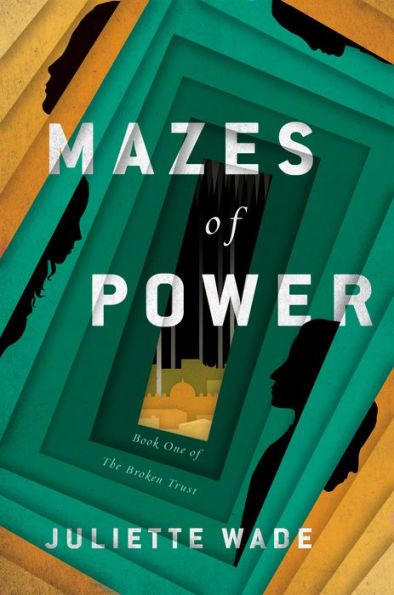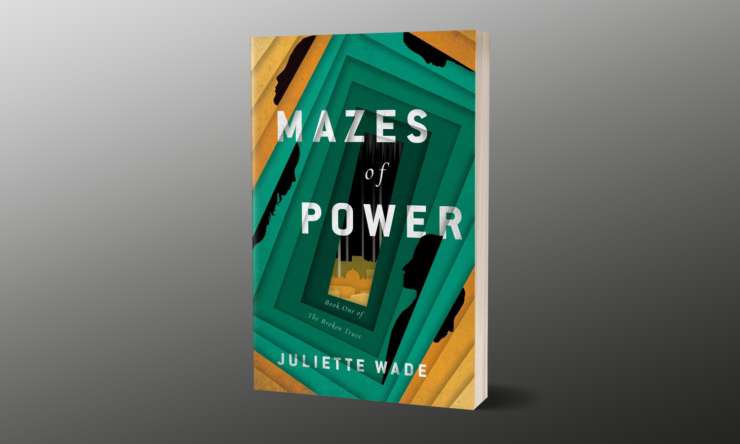Juliette Wade’s Mazes of Power is a thought provoking and immersive work of sociological science fiction in the footsteps of genre luminaries like Ursula K. Le Guin, Doris Lessig, Jack Vance, and Eleanor Arnason that has coincidental relevance in our world with the news surrounding the Coronavirus outbreak.
The story of centers on an alternate human world with no connection to our own. It is a world of faded glory, descending from its high peak—similar in spirit to the world of Charlie Jane Anders’ The City In the Middle of the Night. Humans now live almost entirely underground and the surface world is regarded with dread and fear in an almost Asimovian Caves of Steel sort of mode. Society is stratified, split by class and social status. Conflicts that may be present in our own world are reflected here in a much more violent manner, especially when it comes to politics. The Varin, the high caste of this world, are on a precipice of power, and it is the actions of one of their families and its scions that will decide the fate of an entire city and world.
Jumping with both feet into a sociological work is a daunting task, and Wade goes to it with gusto. Her love and interest in worldbuilding (as evidenced in her weekly videocast on the subject, Dive Into Worldbuilding) does provide the author with the tools to build a world from scratch where sociological speculation is the overwhelming focus. The author isn’t interested in technology, and what we do see is not really detailed extensively, leaving it to the imagination of the reader in order to fill in the gaps. A lot of the book is centered on the society, culture and the social aspects of the world created by Wade.
Buy the Book


Mazes of Power
It’s a pretty tall order to try and build a human society without any connection to our own and have it stand as a unique culture and social world. I would say that in some ways, it’s harder to do this for a human society than one with “rubber headed” aliens. We expect aliens, be it Vulcans or Wookies, to be different. We’re ready for them to have very different social structures, family structures, political dynamics, we can buy into those, no matter how strange they might be. They might be difficult to understand, but we can expect that this might be the case, and that does give a writer an advantage.
Human societies with norms and cultures and aspects of their own, divorced from ours in radical ways, is a far more complicated beast to tackle for an author. The author has to signal just how different and alien this human society is, but not so much that the reader rejects the world and the characters when they don’t within the penumbra of potential human norms. And you want it all to make sense so that the reader can start to put things together and move into the world and engage with it and its characters, so that, just like more familiar societies and cultures, the reader has a shot at being able to anticipate what characters might do, and will really engage with their stories and their world. Wade writes in a dense and careful manner, with paragraphs and even sentences doing double and triple duty to explain and give ballast to her world, in addition to characterization, plotting and theme. Right from the get go, the word choice that the author uses is careful and deliberate, conveying a lot in a small space (The author’s background and strength in short fiction really pays off here, she knows how to engage a reader with multiple axes effectively)
The result of all of this care in building a strange human world is wonderful. An invented language and alphabet is just the beginning. The underground setting of the city is shown through character’s perceptions, reactions, and how the inhabitants speak and act. It’s the 90% rule of worldbuilding, with the 10% that we do see in the novel clearly being propped up by an enormous amount of assumptions that the author has set, but does not dump onto the reader in walls of text. The stratified social structure of the society, both between classes and within classes leads to a very mannered sort of social world. It’s recognizably human and there may be echoes here of human societies that rely on very formalized and ritualized structures, but it is a world that is inevitably and invariably the author’s own. It comes across to me like the best of authors like Jack Vance and Ursula K. Le Guin.
The author uses this setup and the problem of a disease that affects only the higher social classes (and some really well thought out social knock on effects to that) to drive her characters, which in turn drive the plot. That feels like how this world and novel were constructed—society, then characters emergent from that society and world, and from those characters, coming up with the plot and story. This means that a culture and society with an ornate and careful use of how servants are trained and act among the higher classes helps drive the center characters, Aleran, the servant who becomes part of a First Family, Tamelera, the wife to the patriarch of the family and who winds up taking Aleran on have a complicated relationship from the get go. What Wade has to do and manages to convey is what a typical Lady and servant relationship looks like among the Varin, and how Aleran manages to violate and transcend those norms.
Similarly the other two major characters, the brothers Tagaret (most of the novel is told from his point-of-view) and his brother Nekantor also have to show what a brotherly relationship normally looks like in this society, especially among the ambitious Varin, and then subvert that by showing how the two brothers conform and do not conform to those standards. Tagaret and Nekantor both are characters who do not fit the mold of what scions of this society normally do (as seen by their peers, friends and rivals) and the author provides a nuanced look at them, both internal and externally. Their dynamic and their relationship drives a lot of the plot of the novel and the author absolutely has to nail that relationship in this alien society for the book to work, and she does.
Nekantor and Tagaret are a contrasting pair, and that contrast, and how they very differently engage with their world is delightful. We don’t get much from Nekantor’s point of view. He is the protagonist not in the usual sense of being the “hero” or the character we are meant to identify with, but rather he is the protagonist in the same way that the Joker is the protagonist of The Dark Knight: He makes things happen, he propels the story forward and makes the decisions that Batman, the antagonist, has to react to and oppose. While Tagaret has goals, plans and hopes of his own, he is forced into reluctant reaction by Nekantor moving toward his goals. The characters are almost operatic in their passion, their passions leap off of the page.
With all of the sociological elements, one might expect, finally, a strong emergent theme in the novel. Societies that are alien human ones have the potential to show a mirror to ourselves, to speak to what our world, what our social relations are like, through the lens of a world, a society, a culture that is very different. Mazes of Power engages with themes of class and social stratification and how that society reacts to stress. The Varin have a stress of slow but inexorable decay, social strife, and the ever-present threat of disease and how it weakens a society with fear and loathing. While the novel was written long before the current outbreak of the Coronavirus strain hitting the news, for all how alien Wade has made the Varin and their world, their fear of the communicability of disease feels unexpectedly relevant and timely.
Mazes of Power is a powerful work of sociological science fiction that looks at us, through the lens of a society that is alien, and different, and yet the characters are unmistakably human. Come for the worldbuilding and see how an alien human society works, stay for the characters who act passionately, impulsively, and ultimately with humanity.
Mazes of Power is available from DAW.
An ex-pat New Yorker living in Minnesota, Paul Weimer has been reading sci-fi and fantasy for over 30 years. An avid and enthusiastic amateur photographer, blogger and podcaster, Paul primarily contributes to the Skiffy and Fanty Show as blogger and podcaster, and the SFF Audio podcast. If you’ve spent any time reading about SFF online, you’ve probably read one of his blog comments or tweets (he’s @PrinceJvstin).










